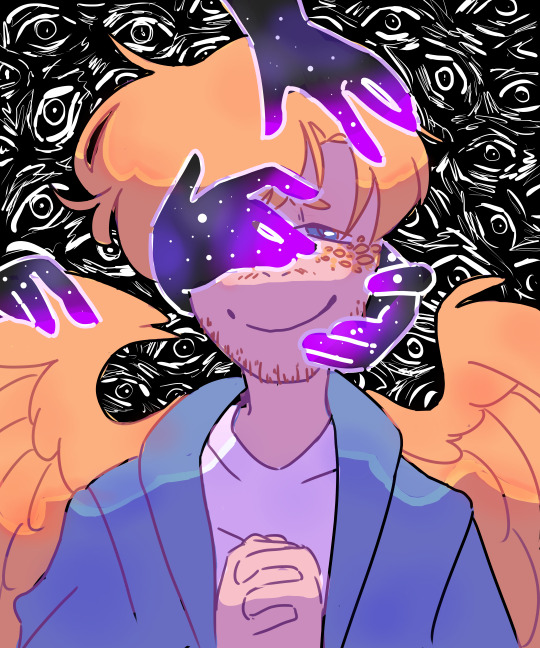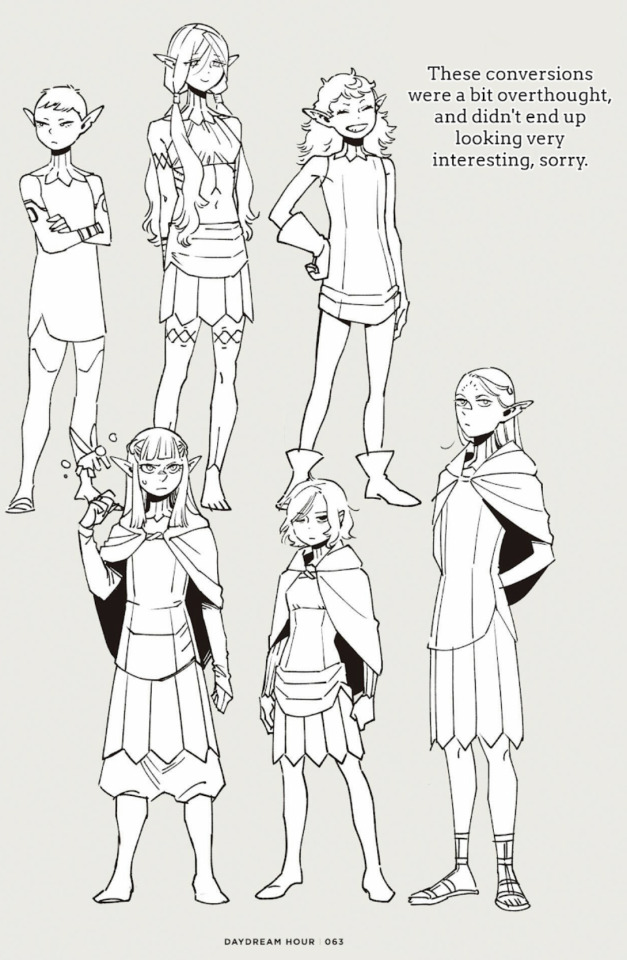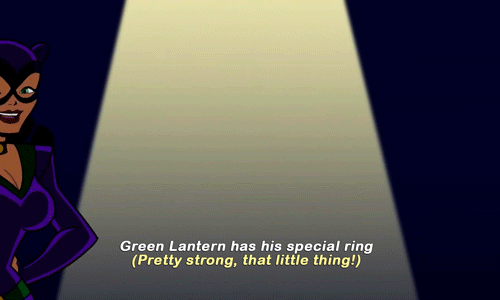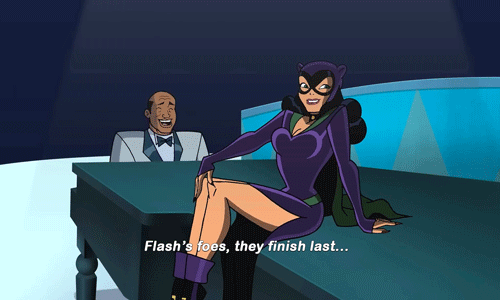#(canary is small)
Explore tagged Tumblr posts
Text

Dear Canary, since you asked so nicley, we can make a exeption just for you
#art#wildlife#wild life spoilers#wild life smp#wild life fanart#wild life series#trafficblr#life series smp#traffic smp#life smp#wild life jimmy#canary curse#jimmy solidarity#solidaritygaming#traffic light smp#mcyt#life series fanart#the watchers#watcher lore#it got so bad it turned into religion#artists on tumblr#digital artist#small artist#digital art#solidarity gaming#jimmy solidaryty fanart#watchers fanart#i am so happy that Jimmy is not out first
1K notes
·
View notes
Text
The Canaries are so funny because it genuinely took me a minute to figure out what this image even was. It’s a genderbend. THEY LOOK IDENTICAL 😭

#Look how small fem Mithrun is :3#Female Lycion feels illegal to look at-#Cithis looks like masc Marcille lol#Pattadol Fleki and Otta just. Haven’t changed.#Cithis Ofri#Mithrun of the House of Kerensil#Pattadol of the House of Vari#Fleki#Lycion#Otta#Canaries#The canaries#Dunmeshi#Dungeon Meshi
3K notes
·
View notes
Text

painting hanging at my grandma's staircase
#ᛕꪖꪶꪮᦓᛕꪖᧁꫝꪖꪻꪮᦓ#The Death of the Canary by Jean-Baptiste Greuze#rural gothic#rural goth#regional gothic#art#ruralcore#small town gothic#gothic#poland#classical art#attic#painting
819 notes
·
View notes
Text




No one does it better than the Birds of Prey!
Batman: The Brave and the Bold season 2 episode 17: The Mask of Matches Malone!
#joy.gif#dc#dc comics#batman#batman the brave and the bold#batman dc#bruce wayne#birds of prey#catwoman#selina kyle#black canary#dinah lance#huntress#helena bertinelli#dcedit#gifset#gif#btbatb#realized a wee bit too late that the text is probably too small but wtv
481 notes
·
View notes
Note
TRICK OF TREAT!! Happy halloween!! :DD

“Of course, a Winner couldn’t understand.”
The first trick!! A little angst, just a tad! With the Bamboozlers!
#wild life#wild life smp#life series#jimmy solidarity#gtwscar#ldshadowlady#bam boys#bamboozlers#just small idea of the two canary’s and the fresh winner
253 notes
·
View notes
Text

Prev | Next
Mithrun startled :(
Pattadol and Otta doe
Also, I think havin a weekly schedule is okay for this comic? I post every friday :)
I dunnow how many pages this'll be, but as im doing the sketches, I'll know :)) this is super fun, i love makin comics! i got so many ideas! yay!
#small artist#delicious in dungeon#mithrun#mithrun dunmeshi#mithrun delicious in dungeon#dunmeshi mithrun#dunmeshi kabru#kabru dunmeshi#kabru dungeon meshi#kabru#kabumisu#mithrun x kabru#kabru x mithrun#kabru fanart#mithrun fanart#dunmeshi memes#dunmeshi art#dunmeshi#dungeon meshi art#dunmeshi au#dungeon meshi fanart#dungeon meshi au#mlm art#dungeon meshi meme#queer artist#artists on tumblr#pattadol#the canaries#otta#otta dunmeshi
91 notes
·
View notes
Text
hits the disinformation machine with a bat a big bat a big heavy lead-core thick wood bat kablam whack whack whack whack whack. miguel ohara does not have "spider instincts," he has never in even one piece of official material ever had nor experienced the phenomenon that fandom colloquially refers to as "spider instincts," okay, that concept is entirely and 100% a fandom-born headcanon that people created post-ATSV as an excuse to write the guy as a stupid Feral Brown Beast-Man caricature . lord have mercy. it takes. two seconds of research 2 not perpetuate racist malarkey. do better
#talking tag#spider-man 2099#spiderman 2099#miguel o'hara#atsv#across the spiderverse#hi. dead canary walking here#one more person calls him Feral. calls him animalistic. bestial. stg im killing the hostages.#THE furthest extent of any quote-unquote Instincts that is ever brought up in SM2099 is a small scene where he comments upon--#--theoretically Already Having th necessary neural pathways and instincts in place to use nd control his powers as he adjusts 2 getting the#fucksake. calling a mexican man that you already dont see as human Feral is not a compliment get it thru ur heads.#pejoratives r not Flattering th shit used 2 dehumanize Actual People for centuries isnt a Quirky Funny Thing to call an indigenous characte#christ. if youve never read sm2099 then ur bad faith self-righteous sm2099 opinions are less than worthless to me.#You Are The Emperor Without His Clothes On waving your dong all over the town square. just shut up already. youll look smarter.
257 notes
·
View notes
Text
what if Lizzie didn't die?
nobody's ever fallen out of the void before, so no participant has ever come back to tell the tale of what that's like. the communicator says she's eliminated, and everyone shrugs and carries on, because for all they know, she is. Maybe there is a ground to hit down there, or some monster that swoops in and kills in a single blow.
but the thing is - there's no end in a void. it just continues forever. and ever. and ever. it's simple physics; a void/vacuum is a blank space, a complete and total absence of anything at all. there's nothing there that could have killed Lizzie because, by definition, nothing is in the void at all. not even time could have gotten her.
now imagine being condemned to a place (or as close to a place as the void can get) where you will never see anything again, hear anything again, falling falling falling, towards a ground that will never appear. a place where you can never look into anyone's eyes ever again. eventually, a green streak in brown hair is the only memory you have of another human existing that hasn't been lost to the millennia you've spent falling. this place where you will be the only thing that exists, the only thing that will exist, and the only thing that has ever existed, slipping through the cracks of time, eternally in solitude.
wouldn't that be a fitting place for a woman who spent all her time on solid ground alone, with almost nobody to care for her? falling so far out of the bounds of reality even the watchers don't know she's still alive? so beyond the reach of anybody that nobody will ever hear her calls for them to come to her, let alone heed them? and let's be honest, if they could hear her, would they even come?
and who knows, maybe when the next season rolls around, for some strange, inexplicable reason, the watchers can't find Lizzie. It's no trouble, they can construct a new Lizzie from her memory, even if it's one season behind. and maybe this time, Lizzie has better luck and lots of friends. she doesn't really get why Scar is so apologetic, or Joel so clingy, or even why she constantly feels like she's teetering on the edge of a precipice, about to fall. but that's just her being silly, right?
all the while the original Lizzie falls forever. forgotten again.
#and this is why the canary curse still exists AYYY#but i wanted the post to be about Lizzie because people should be talking about how she's the most tragic life series character ever#and i will die on this hill#but also imagine Joel reunited with his wife ESPECIALLY if he wins#and him being like “hey i avenged you!”#but even if he feels that something is off he won't ever know that the original Lizzie is still falling and always will be#wait i just realized this technically means that she would win Secret Life no matter what LMFAO i love terrible HCs you think up at 3 am#secret life#trafficblr#ldshadowlady#smallishbeans#tagging him even though he's a small mention#felt like it counted#my post
311 notes
·
View notes
Text


First Meeting
#kabumisu#mithrun#mithrun dungeon meshi#mithrun of the house of kerensil#kabru dungeon meshi#kabru#kabru of utaya#part of kabru's mind is focused on laios and the dungeon#another on the canaries and the future of the island#and a small but loud part wanting to poke mithrun's hair whorl
110 notes
·
View notes
Text
Abuse, Silence, And Why Kevin Can Fuck Himself
I recently finished watching Kevin Can Fuck Himself on Netflix, and, aside from being the most brutally honest portrayal of domestic abuse I have ever seen, I discovered a beautifully written examination of narrative as power and silence as abuse and how this manifests in our larger culture.
Without going into too much detail, the show is filmed in two distinct styles that are interleaved throughout each episode to tell a cohesive story. Allison and Kevin’s relationship as seen by the rest of the world is told through a multi-cam, laugh-track sitcom that depicts a very typical “goofy husband, shrewish wife” mainstream comedy. Allison’s life through her own eyes is told through a single-cam drama/thriller about Allison planning to murder Kevin to escape his abuse.
It’s an absolute masterclass in screenwriting, but more than that, every episode explores the difference between truth, fact, and reality, and how none of these things are quite as much or as little as story. But while the process of transforming the chaotic and plotless reality of life into a story is as involuntary and essential as breathing, misogyny and the degradation of women is just as ubiquitous in our society, and a story that exists at the expense of another person’s lived reality is a refutation of their humanity.
It's also just a great show for anyone who likes to engage with history (or reality TV or true crime or “real life stories” in general), because while we have to tell ourselves stories about her own lives, we have to tell ourselves stories about other people as well. Eternal silence is narrative death, and the perpetual silence of an unspoken narrative is often the last death we can visit on someone whose story we’d rather ignore.
I also pulled up some books – Lolita and Disgrace – that dealt with similar themes, but from the perspective of the abuser. And what strikes me the most is that, across three beautifully written stories about narrative and silence within a culture that normalizes abuse, Allison, who began her story within a state of narrative death, was the only point-of-view character who had any chance of surviving.
One of the main themes of Kevin is that a compelling story is often a story that reinforces what we already believe or like to believe, and while the story may be factual and true it often also exists at the expense of someone's lived reality. The exact same series of events can be a silly joke or a harrowing tale of abuse depending on the lens through which we view it, but historically we've only been willing to see the multicam, laugh track, sitcom perspective on unbalanced relationships.
The alchemical process of turning a series of disjoint facts and experiences into a narrative creates something new and compelling, and erases much of what previously existed. In this way, it’s entirely irreversible. We spin our experiences into a very thin thread, a story we can tell ourselves that elicits something within us, something we need in order to live with the complex, uncertain, and unsatisfying reality of life. In think in many ways the thing we elicit in ourselves is truth. But truth is both more and less than fact, often more a reflection of our own beliefs and desires than the events of our lives. And in telling that truth we may never stray from the facts, but we almost by definition cannot give voice to another person’s reality.
There's a scene in season 2 of Kevin when Allison is hit by a door – a la the classic excuse – because of Kevin’s carelessness. And while he absolutely did not hit her, the way it's written is such an incredible allegory for how Kevin has curated their story and curated their friends' and family’s perceptions of their story such that even if she tells everyone the exact, unvarnished truth of what's happening to her and begs for help, they will only be capable of seeing the laugh-track, sitcom, “Kevin is a harmless goofball and his wife is a total shrew” perspective on the events of their lives.
As so often happens with abuse, their friends and family saw Allison being hurt because of Kevin. But the alchemy of creating a narrative around Kevin and Allison is irreversible, and the series of events they witness can only be spun together to a joke, an accident, a silly, childish mistake. Allison’s reality, Allison’s pain and fear, is completely elided. Like a lost sound in the middle of a sentence, her experience goes silent, and their larger understanding of her relationship never has to change. And you feel so acutely how Allison lives her entire life in that silence.
Storytelling is human, it’s essential, there’s no other way to engage with our own lives. And it’s not lying. It’s never lying to tell the truth. But it doesn’t reflect every reality, either, because another person’s reality can’t be reflected within our own narrative, because that’s what it means to be another person. To spin two different threads.
And because narrative is the essential process by which we understand our reality, denying someone their own narrative, or denying that this narrative be heard, is inherently abusive. To allow someone a voice is to give them humanity, and to suppress it is to strip that humanity away.
Disgrace, by J.M. Coetzee, follows the story of a professor, David, who rapes a student and then fails to protect his daughter, Lucy, from being raped by intruders in their home. He destroys his daughter’s life – not through failing to protect her, but through twisting her rape into a story about why the rape of his student wasn’t wrong. The main theme of the book is generally considered to be exploitation, but Coetzee doesn’t deal with the exploitation of the rape. That’s too direct, too immediate, too easy for the reader to understand as misogynistic and wrong. Rather, Coetzee delves into “the innocuous-seeming use of another person to fill one's gentler emotional needs” (Ruden).
The rape is how we understand David as a fundamentally exploitative person, a person who denies others their humanity by converting them into a vessel for his own desires, who erases their voice in order to speak through them and give himself the things he needs. And that’s how we recognize that the way he absorbs and claims the stories of his daughter and his student is another kind of violation of their humanity. Another way of turning women into vessels for men’s pain and fear and need.
What’s fascinating is that David's student finds her voice – files a complaint against him – and is eventually able to continue with her life. The woman he raped is less damaged by him than his own daughter, because she was the woman he couldn’t permanently silence.
In Lolita, another brilliant novel about abuse, dehumanization, and storytelling, Humbert turns to the reader at the end and says, “Imagine us, reader, for we don’t really exist if you don’t.”
It’s not that Humbert knew he was fictional, but that he knew everyone was fictional. Believed the entire world only truly existed in his own mind, because anything beyond that was irrelevant to his needs. He coped with the collapse of his ability to dehumanize Dolores (who he called Lolita) by demanding that his voice be resurrected. Demanding immortality. Demanding his narrative exist in another person’s world, and thereby be given the existence and humanity that Allison and Dolores and Lucy and David’s student were denied.
Pushing his needs, finally, onto the reader, because we are the only person he has left, and a person like him can only exist through the use of another. In that way, Humbert was powerless. In that way, Kevin and David were powerless, too.
In Disgrace, David’s dream is to write an opera, and at the end of the book he realizes he’ll never finish his magnum opus. He’ll never be able to terminate the process of converting himself, his world, into a story. But he does learn to decenter himself in that narrative. And it’s when he loses all fear of death, and any conception of the self, that he gains the ability to give dogs – who he generally equates to women – a voice within his opera, his life’s work.
It’s in death that we discover our true unimportance as human beings, that we learn to let go of vanity and our conception of the self entirely. And David had degraded women so thoroughly in order to justify how he used them to meet his own emotional needs that it was only in losing all value for his own life that he could gain the ability to see them as equal voices. To actually put those voices into his own life story. It's at the cost of himself that he allows other people to truly exist, in the death of the self that he finally allows the world to exist outside of himself. It’s almost a positive character arc. Almost.
When Kevin finally loses the ability to abuse Allison, he, like many abusers, loses all desire to live. His world was built on a structure of superiority and inferiority, on beings and vessels, on the inherent value of men and the inherent meaninglessness of women’s lives. The system on which he based his entire reality has been destroyed by Allison’s declaration of the self. And, if he was a being because she was a vessel, then in losing the ability to treat her as a vessel, to fully and completely dehumanize her, he has lost his own humanity.
It may be perfectly summed up here: “Become major. Live like a hero. That's what the classics teach us. Be a main character. Otherwise, what is life for?” (Coetzee).
If you’re not to be a main character, if there indeed is no split between major and minor characters, between people and the paper dolls that populate their story, between living beings and the vessels into which they pour their need – what is life for?
Nothing. At least, not for people whose narrative must exist at the expense of another.
And that’s why I say that only a narrator like Allison could survive this kind of story. Despite beginning her story trapped in eternal silence, her reality fully elided no matter how immediate and obvious it became, Allison was the only point-of-view character of any of these three stories who didn’t establish her power through the degradation of another. Who didn’t conceptualize the world via being and vessels. Whose narrative didn’t exist, by necessity, at the expense of another person’s humanity. Whose thread could exist in a larger tapestry without destroying her sense of self.
Don’t get me wrong, she’s not generally a likable character. She’s misogynistic, cruel, selfish, jealous, desperate, afraid, and in pain. Like anyone in an abusive relationship, she’s not at her best, and she’s often pushed to do things that are ugly and disturbing because she’s simply been pushed too far.
But, for me, the power in her character is in how her last scene never felt like a final scene. Her story didn’t have to be killed, her conception of the self didn’t have to be killed, in order to reveal the brutal reality of stories twisting and intertwining without any inherently superior truth or narrative among them. Allison’s story was one of declaring herself. And that’s why it didn’t feel like it ended at the end. Instead, this felt like a beginning.
#this is probably the most egregious 'post that no one asked for' that I've ever written#but man this show HIT me y'all#and then I went back and reread parts of disgrace and that hit me too#it also made me reconsider my online presence and how I myself engage with narrative in the very small little world I'm a part of#I caught some shit a while ago and made a conscious decision to never comment on the narrative around the beatles#and to be clear I was just talking about a general narrative in society at large I wasn't bringing up anything specific or attacking people#more how larger social narratives filter into and sometimes come to define individual stories#but it was upsetting to people and I figured instead I can just try to express a compassionate perspective on the mentally ill myself#but now I wonder if I've gone too far#idk without naming any names I'm getting unblocked by people who should definitely still find my mindset intolerable to their worldview#and I don't blame them because we all have reasons for the things we believe and we're all just doing our best#but it's a canary in the coal mine#it makes me think I've become so focused on not ruffling feathers that I'm tacitly approving some disturbing beliefs#and I think I could have happily ignored that if I hadn't just watched this show#posts that no one asked for#kevin can fuck himself#kevin can f*** himself#op#longer rambles
38 notes
·
View notes
Text
them <33
no Chilchuck sadly, but I have a load of drawing ideas for him and he's one of my favorites anyway

#artists on tumblr#small artist#illustration#digital art#queer artist#art style#my art#drawing#original art#dungeon meshi#delicious in dungeon#digital fanart#fanart#laios touden#laios dungeon meshi#senshi#senshi of izganda#shuro dungeon meshi#shuro dunmeshi#shuro fanart#toshiro nakamoto#nakamoto toshiro#kabru of utaya#kabru dungeon meshi#kabru dunmeshi#kabru#mithrun#the canaries#dunmeshi
41 notes
·
View notes
Text
appalachian!toudens au. i have genuinely no idea how or why they would meet most of the cast to be honest. but making most of the cast southeastern/appalachian states american is really funny to me. marcille is from suburban new york state. she is still italian
#she says shes from new york. the moment she meets someone who is from nyc (i dont know. other elves the canaries fuck it)#she goes thru the Interrogationnn i thjnk that would be so funny lol#she would be used to us know nothing southerners not knowing there is new york outside of nyc ✊😔#im inventing a small but successful extremely small town for falin and laios to be from#also a lot of white people here have ethnic Pale As Fuck European backgrounds so they get suuuuuper red in the summer and suuuuuper pale in#the winter lol#dm
21 notes
·
View notes
Text

Day 315 of bird brainrot
#ieytd#i expect you to die#ieytd oc#Canary#Cardinal#Operation: Songbird#lavalampstealer#are we party rocking with the birds? I hope so bc there’s more of them coming soon. at least more of Canary#perhaps soon I may do a small story dump on them. of various missions and whatnot once I work out some of the details#also this was inspired by some of neurotonic’s art#the color blocks + silhouettes are so fun to work with
45 notes
·
View notes
Text
Ack..Vampire Mithrun and Ghost Bride Kaino.. (Mithrun and Kaino.? What WHAT?? WHO SAID THAT!??) (Honestly, if I get hate it's most likely this is the reason)
(She barely looks like a ghost imo)

I like em yall
Bonus!!: Lycion and Kaino.. (Hehehehfjrhebrhufhfbrbrhejeu) I'm going insane guys

I drew his hands too big sorry bout that

Where I got the ref for them from ^^
#art#original character#oc#small artist#oc x canon#oc x cc#artists on tumblr#oc art#delicious in dungeon#dungeon meshi#dunmeshi oc#dungeon meshi oc#dungeon meshi fanart#dunmeshi#mithrun#lycion#dunmeshi mithrun#dunmeshi lycion#the canaries#dungeon meshi mithrun#dungeon meshi lycion#digital artist#digital art
35 notes
·
View notes
Text




i hate this stupid app it keeps crashing TODAY'S EPISODE WAS GREAT 👍
#dunmeshi#really cool art i thought up#mithrun#milsiril#yaad#I LOVE YAAD ! I LOVE YAAD !#dont pay too much attention to the coloring i was just messing around#dunmeshi spoilers#cause of the mithrun quote i guess#btw milsiril was in the background in the utaya flashback. along with Our canary squad except for mithrun ... they were all so small
38 notes
·
View notes
Text
also can you believe someone said toshiro wasn’t important/didn’t come in clutch as a reason why people should hate him (paraphrasing) when him and that damn bell…
#he’s going to be haunted by ringing noises. forever.#it helped prove laios was still alive and fucking about…#ok. admittedly it’s a small detail BUT IT WAS THERE!!! and he and namari helped place doubt in the canaries…power of friendship ily#side characters save me side characters#my post#dungeon meshi#toshiro nakamoto
28 notes
·
View notes